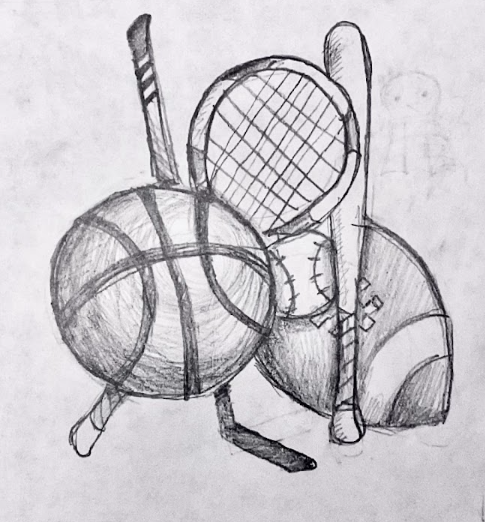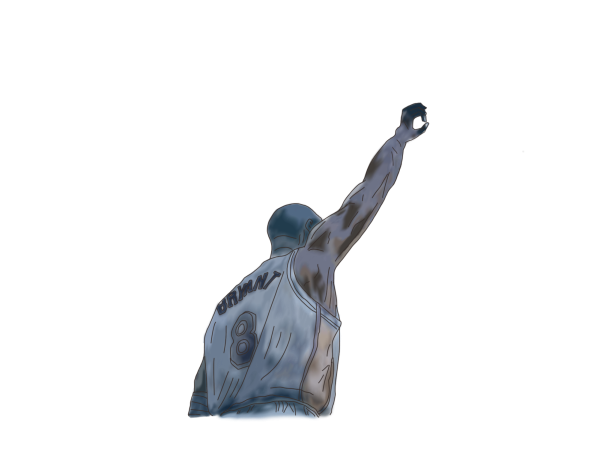Which Sports Should Qualify For A Letterman’s Jacket?
Pro
Letterman jackets are regarded as a symbol of personal achievement for athletes who compete in traditional sports, such as football, baseball, soccer, and water polo. Who is to say that marching band, colorguard, and even the debate team do not deserve a letterman jacket as much as the other, more conventional, sports teams do? These three teams should be seen as eligible to get a letterman jacket because of their determination to work hard, to put time and effort into what they do, and to craft competition-winning strategies: they put in just as much work as teams like football, water polo, soccer, and baseball.
Marching band uses physical activity in their performances by doing exercises to control their breathing so that they can play while staying on time. Stepping together on the same foot while they are marching, focusing on their music, and paying attention to their drum majors’ counts are all ways that they rely on each other and support one another so that they can perform well. Marching band is not just about walking in lines; there are certain movements that each band member has to make to keep up with everyone around them. If one person is off, it is extremely noticeable, which is why they work hard to stay on time and why they have long practices during the school week.
Color guard is not an easy sport; most people think that it is just a team of flag twirlers and batons, but in reality it is a team full of people who work hard to spin flags, sabers, and rifles. It may not be something that everyone considers a sport, but it requires just as much training, motivation, and strategizing as any other sport does. The team practices for 10 hours over the course of the school week, and an entire period during the day is devoted to practice.
Another sport that is overlooked by many CHS students is the speech and debate team, which also deserves the credit of earning a letterman jacket, even though they are not physically active. The speech and debate team is mentally active, in fact, and they think in ways that other sports do not. For example, speakers and debaters use critical thinking, step out of their comfort zone to speak in front of an audience, and use techniques to increase the effectiveness of their speeches. Contrary to popular belief, speakers and debaters actually compete against each other to win awards; the sport is not a walk in the park. Claremont team members compete for individual as well as team prizes at each tournament, and elements of traditional solo (e.g. swimming) and group sports (e.g. water polo) are incorporated into the sport as a result. Speech and debate works hard to reach all their goals. It is a commitment that is very time-consuming but worth it in the end.
In general, sports should teach CHS students how to be confident in what they do, how to fight for what they believe in, how to work well with others, and how to manage their time wisely. With playing a sport at CHS comes great honor, and a letterman jacket adds to that pack pride. A letterman jacket symbolizes the hard work that every athlete has to put in to succeed, and it should not be exclusive to traditional sports.
Con
Nowadays, it seems as if letterman jackets are being thrown around schools without much thought put into how they affect student-athletes. While it is true that extracurriculars such as band, speech and debate, or color guard do work hard, this simply does not coincide with earning a letterman jacket. Letterman jackets should be rewarded for athletic achievements only, since rewarding them to non-athletic extracurriculars takes away the value of a letterman for student-athletes.
Letterman jackets have often been considered the quintessential high school memento for any varsity athlete. Those classic brightly-colored cloth jackets with leather sleeves and patches are more than just jackets; they signify that the athlete wearing it puts their blood, sweat, and tears into working to earn the privilege of wearing that jacket. Lettermen are traditionally given to only varsity sports teams and it should stay that way. Lettermen are a huge incentive for many high school athletes to go the extra mile to shoot, literally, for making a varsity team and earning that jacket. However, if schools start throwing them at non-athletic extracurriculars, it undervalues the tradition and honor an athlete gains when awarded a letterman. In addition, there are many alternatives to a letterman jacket such as sweatshirts, medals, or even a different type of jacket. The real question is why these non-athletic extracurriculars can earn these jackets in the first place.
As well as a valuable memento, letterman jackets are a tradition used to honor athletes specifically. The honor of being a varsity-level athlete is an incredible accomplishment that should not be taken lightly. Therefore, it will take away the honor of being known as one of those top-notch athletes when you allow non-athletic extracurriculars to receive letterman jackets. This is in no way, shape, or form an attempt to undermine the work other extracurriculars do, but not all things that have competition are a sport. Therefore, those students should not receive letterman jackets because they are not athletes.
While the band does work extremely hard, they do not specifically deserve a letterman jacket since they are not a sport. The reasoning behind this is very simple; when you begin to hand out these jackets to more and more extracurriculars, suddenly everyone gets one. When this happens, the value of the jacket and the tradition that comes along will be completely lost and athletes will no longer get the recognition they deserve. In other words, non-athletic extracurriculars should not qualify to earn letterman jackets!
Hello there! Our goal is to provide relavent, engaging journalism for readers of all ages. Your donation will support the student journalists of the Wolfpacket at Claremont High School, and will allow us to purchase equipment, print our monthly issues, and enter in journalism competitions. We appreciate your consideration!

Dilyn Lopez is a junior at Claremont High School and a reporter for her first year on the Wolfpacket. She is very excited to see where her writing abilities...

The 2020-2021 school year marks Ady Bolinger’s second year on the Wolfpacket staff. Bolinger, a junior at Claremont High School, holds an editorial position...
















